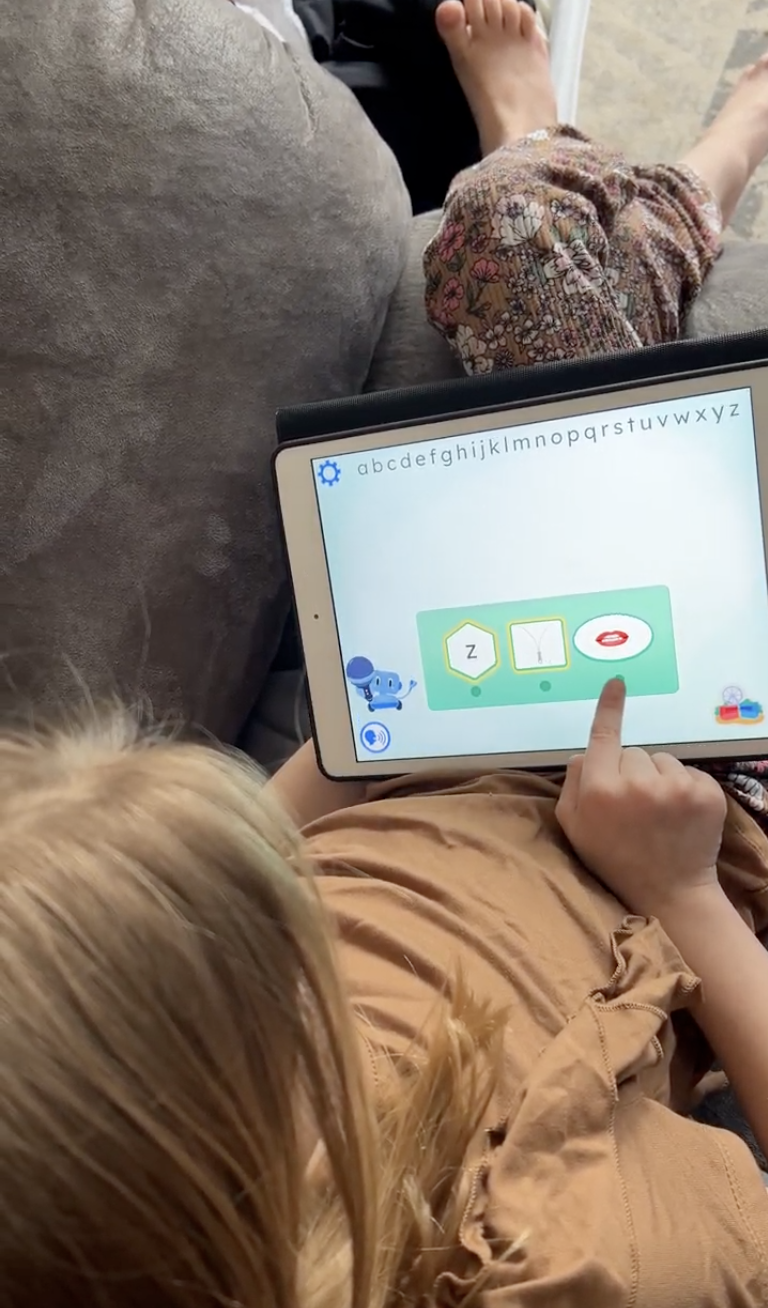
through the Sprout app that provided the repetition Sarah needed
When Marcy enrolled her daughter Sarah in Sprout Labs, Sarah was struggling with basic letter recognition and sound blending. After 8 months with Sprout Labs, Sarah entered Kindergarten ahead of the game with skills her teacher hadn't even introduced yet.

Sarah's mom, Marcy, noticed her PreK daughter was slower to develop foundational reading skills like letter-sound recognition and blending compared to her siblings. Despite exposure to early reading activities at home and school, Sarah seemed to need more practice, but Marcy wasn’t sure where to start.
As an occupational therapist, mom knew early identification and intervention were crucial. She also knew that it could take years for Sarah to be flagged for intervention at school, so Marcy decided to work with Sprout Labs to get a true understanding of Sarah’s strengths and weaknesses, and to get paired with an Orton-Gillingham trained reading specialist.
.png)

99th percentile in rhyming, 95th percentile in nonword repetition

4th percentile - Sarah struggled to quickly name familiar objects
A comprehensive assessment by Sarah’s Reading Specialist revealed that Sarah didn't just need more practice ; she needed different and specific instruction.
"Sarah's ability to rapidly name objects is low, indicating that she may require more instruction and practice in order to master skills."
As founders, we know that reading education isn’t just powerful and promising – it’s personal. Some of us have dedicated our careers to studying the science behind reading success, while others of us have experienced first-hand the challenges families face when a child struggles with reading. We know, both intellectually and emotionally, how essential reading skills are for children to grow into confident, happy, and successful adults who love to learn. Sprout Labs was born from this passion.

Co-Founder and CEO
is a business executive, a leader of the Boston Children’s Hospital accelerator that backed the development of EarlyBird, and the parent of a child with dyslexia. She joined Drs. Gaab and Petscher in launching EarlyBird Education, and now Sprout Labs, as part of her personal mission to equip families with the tools and confidence they need to help children discover the joy and rewards of reading.

Co-Founder and Scientific Advisor
Nadine Gaab, was a developmental neuroscientist at Boston Children’s Hospital when she developed the EarlyBird assessment, proven effective at predicting dyslexia and other reading challenges in young children. As both a professional and a mother, she recognized the power of bringing a proactive, preventive approach to educators, and now families, and joined forces with the team to create Sprout Labs.

Co-Founder and Scientific Advisor
Associate Director at the Florida Center for Reading Research, contributed his extensive research, data and expertise in developing and implementing EarlyBird. Understanding the transformative potential of their combined work, he collaborated with Dr. Gaab—not only for reading education, but for improving lives. Together, they combined years of research, data, and knowledge to bring EarlyBird, and now Sprout Labs, to life.

through the Sprout app that provided the repetition Sarah needed

addressing Sarah's specific need for repeated exposure to build automaticity
.svg)
through engaging games that made learning fun
Sarah worked consistently in the Sprout app and had regular check-ins with her reading specialist, who tracked her growth and adjusted instruction as needed.

.png)
Letter Names
Below Average
99th percentile
Complete mastery
Letter Sounds
Below Average
76th percentile
Dramatic improvement
Non Word Repetition
67th percentile
95th percentile
+28 points
Rhyming
Strong
99th percentile
Maintained excellence
Oral Comprehension
Above average
Above average
Consistenly strong
Within a few weeks, Sarah started showing early signs of improvement.
The real victory came when Sarah entered Kindergarten. Her teacher was amazed to discover Sarah had already mastered letter-sound recognition, segmenting, and blending — foundational skills that hadn't even been introduced in the classroom yet. Sarah walked into her first day of formal reading instruction already equipped with the tools she needed to succeed.


Masters in Education with 20+ years experience

Orton Gillingham Certified

Loves using data to tap into students unique strengths
"For Sarah to flourish, her program needed to emphasize the consistent, multi-sensory repetition that would build those neural pathways for quick retrieval.
Sarah's progress proves how powerful a truly individualized approach can be, especially when it targets underlying cognitive processing needs like sound-symbol correspondence, a common challenge amplified by low Rapid Automatized Naming (RAN).
When the right intervention meets a child's unique way of learning, their strengths and weaknesses can come together for amazing literacy gains."
Sarah processes information slowly but thoroughly
Visual, auditory, and kinesthetic approaches accelerated progress
Daily practice in the Sprout app was key for Sarah to build automaticity
Building skills early enabled Sarah to start Kindergarten on track
Sarah didn't lack ability — she simply needed more time and repetition to build automatic retrieval. Once that was provided through consistent, engaging daily practice, her strong phonological awareness could flourish.
.png)
Addressing specific areas accelerated progress
.png)
Helped decode her learning profile and guide targeted support
.png)
Ensured instruction evolved with his growth
.png)
Matched to Sarah's strengths
A: I chose Sprout because of the assessment and the qualification of the Reading Specialists. I love that they are all highly credentialed in the Orton-Gillingham method.
A: My experience with Sprout has increased Sarah's confidence, and mine as well! I'm more empowered to trust my gut when I feel like my kids need extra support.
A: Sarah is continuing to keep up with the rest of her classmates and thriving! It's given me such peace of mind.
A: The earlier you seek support for your child's reading, the better. You won't regret it!
Sometimes reading struggles aren't about a lack of intelligence — they're about a mismatch between how a child learns and how they're being taught.
Understanding a child's unique learning profile can transform their educational experience and unlock their potential.
With the right insight and support, even the most puzzling challenges can become turning points.
